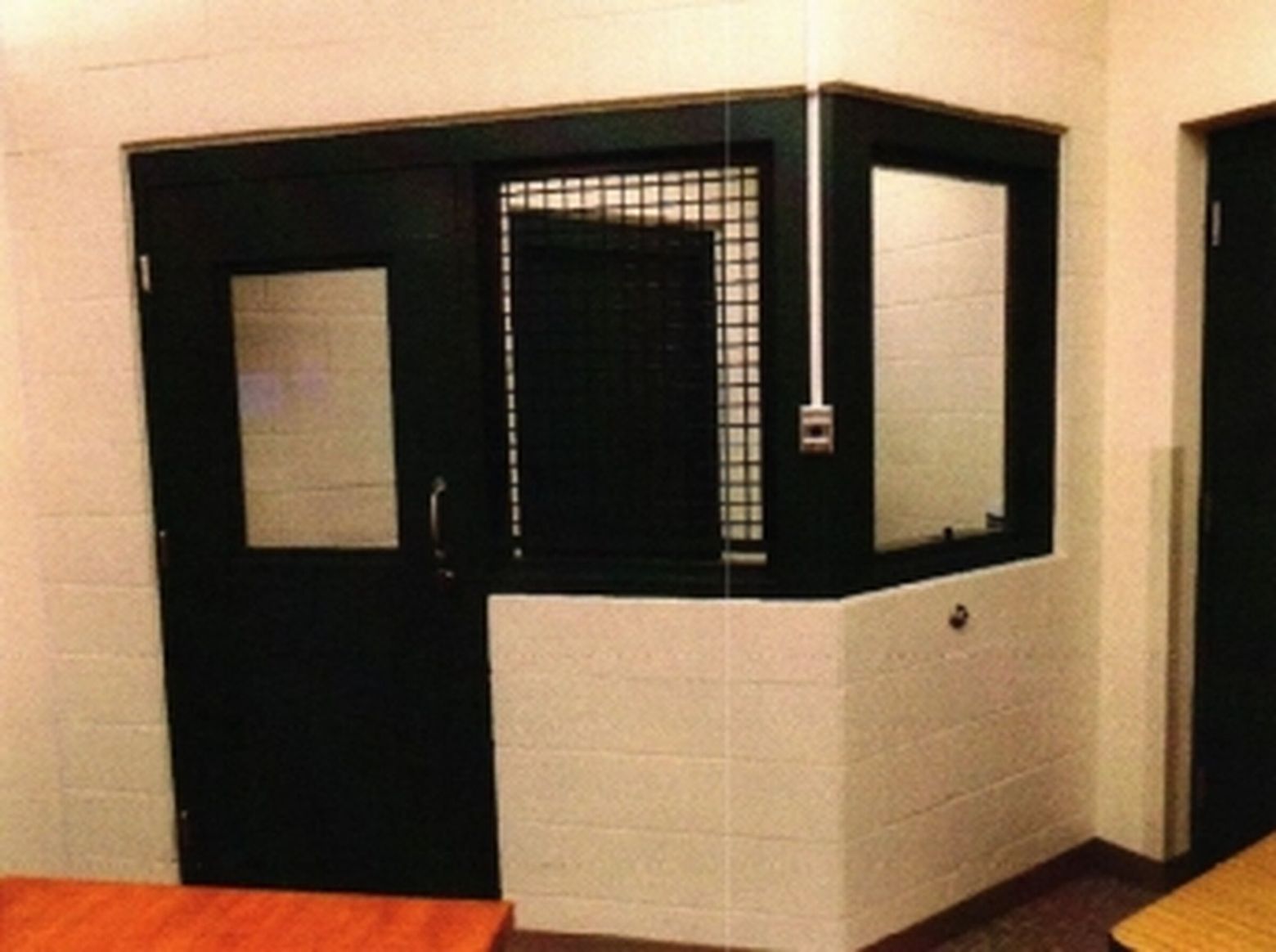In State v. Luthi, the WA Supreme Court held that defendants who appear in an in-courtroom holding cells at jails are essentially shackled, and as such, they may not be placed in holding cells without a specific inquiry into why that’s necessary.
FACTUAL BACKGROUND
In order to fully appreciate the particular restraint at issue in this case, we must first describe the in-court holding cell at the Cowlitz County Jail courtroom used for Ms. Luthi’s hearing.
The Cowlitz County Superior Court often employs a courtroom in the Cowlitz County Jail for short criminal proceedings without witnesses. When the defendant appears for such a hearing, they enter the in-court holding cell directly from a “secured area of the jail.” The holding cell appears to be located at the back or side of the Cowlitz County Jail courtroom, away from the table where counsel sits.
The interior of the holding cell is roughly five feet wide, five feet deep, and eight feet long, with a “mesh window” on the right to allow defendants to speak with their attorneys, and a glass window on the left. Id. (internal quotation marks omitted). Viewed from the courtroom, the in-court holding cell looks like this:

In 2021, Luthi pleaded guilty to Drug Offense. She was given a mental health sentencing alternative (MHSA) of 36 months’ parole. Following two parole violation notices in 2022, the State petitioned to revoke the MHSA. Luthi was taken into custody at the Cowlitz County Jail on December 20, 2022. She was held without bail until her MHSA revocation hearing in February 2023.
Luthi’s defense counsel was already very familiar with the in-court holding cell, which counsel refers to as “a cage on the side of the courtroom.” According to defense counsel, the incourt holding cell was a dehumanizing restraint comparable to shackling. As a form of restraint, shackling cannot be imposed unless a judge finds it necessary. Through counsel, Luthi filed a motion before her MHSA revocation hearing to appear in court without restraints. Counsel argued there was no reason to place Ms. Luthi inside of a cage and for her to be physically separated from the court proceedings. She was not a flight risk, and she was not going to harm herself or others.
The judge denied Luthi’s hearing to be released from the holding cell during court hearings. After her hearing, Luthi wrote an e-mail to defense counsel. She explained how difficult it was to participate from the in-court holding cell. Among other things, it was “almost impossible to speak” to her attorney. Luthi also described feeling as though she was “on display” in the holding cell and “not a part of her own court hearing.”
COURT’S RATIONALE & CONCLUSIONS
Justice Yu wrote the court’s opinion. She held the superior court failed to conduct a individualized inquiry before requiring Luthi to appear in an in-court holding cell. Consequently, Justice Yu reasoned that in-court holding cell violated Luthi’s due process right to appear at all courtroom proceedings without unjustified restraints:
“Requiring defendants to attend court hearings while in a holding cell undermines the presumption of innocence, interferes with a defendant’s ability to communicate with counsel, and violates the dignity of the defendant and the judicial proceedings.” ~WA Supreme Court Justice Mary Yu
Moreover, Justice Yu reasoned the physical separation between the defendant and everyone else in the courtroom created undue biases and assumptions from others:
“Applying reason, principle, and common human experience, we must conclude that this constant reminder of the accused’s condition could invite any decision-maker to draw negative, prejudicial inferences, even at a subconscious level.” ~WA Supreme Court Justice Mary Yu
Finally, Justice Yu reasoned the in-court holding cell is contrary to the courtroom’s formal dignity, which includes the respectful treatment of defendants:
“In the United States, defendants traditionally sit next to their counsel at counsel table, and courtrooms have historically been built without docks or incourt holding cells . . . Compelling a defendant to appear from an in-court holding cell without justification creates the perception that the rest of the courtroom is really a theater . . . making the defendant an exhibit or spectacle in the trial.” ~WA Supreme Court Justice Mary Yu
With that, Justice Yu and the majority court reversed and remanded Ms. Luthi’s MHSA revocation to the superior court for a new hearing.
Please contact my office if you, a friend or family member are charged with a crime. Hiring an effective and competent defense attorney is the first and best step toward justice.







